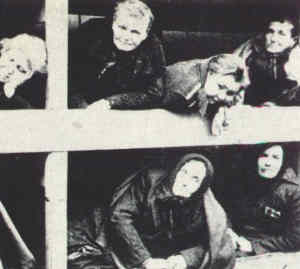|
Bubbie & Zadie Recall the Holocaust
By Michael Nadel
Introduction
The following is taken from a transcript of an interview made in 1993 with our Grandparents, Chana (Buba) and Yehudah (Zaide) Nudel about their lives, and what they went through during WWII. Two months after this interview, on Yom Kippur 1993, my grandmother Chana passed away, at the age of 73. My grandfather Yehudah lived for another few years, and passed away in 1997, at the age of 83 (?). May their memories be blessed.
Because of their broken English, and because of the order of the things we discussed with them, the transcript was in disarray. So after typing the transcript, I retyped it in a more readable manner, by using regular English and by putting the things they said in the proper context, and in the order of which they occurred.
What emerged is, I hope, quite a precious testimonial to the atrocities that
they experienced at the hands of the Fascists and Communists Y"S. May the suffering of the Jewish people always be remembered, and passed down for future generations. As it is written "those who sow with tears, with joy they shall reap".
Chana Nudel (Lengalka) 1920 (?) - 1993
Family History
My father's name was Ahron Lengalka (pronounced it Uren), and my mother's name was Shaina Lengalka. My mother's name before she was married was Bloom. I never saw my grandparents but I remember their names because the children were named after them. My Zaide (mother's father) was called Chaim Bloom, and my Buba (my mother's mother) was called Golda Maria Bloom. I don't remember the names of my father's parents.
In his younger years, my father was a businessman who dealt with men and women's shoes.... with many things... I was brought up in a wealthy family. I had one sister and two brothers. My oldest brother was called Shloimeh, my youngest brother was called Chaim, and my sister was called Golda Maria, we called her "Mania".
Michael: Was there Jewish observance at home?
My father would pray every day, and put on Teffilin. Before the war he would go to a Beis Medrash (study hall), and Shabbos he would go to Shul, and during the war he prayed at home. And my mother, brothers and sisters all kept Shabbos. In Poland, the Jews were very religious.... Chassidim on the streets... It was a small town, but it was a Jewish town.
Before the War
I was born in a little Polish town called Drobzshe, in the area of Plutsk (?) and Warsaw. When I was a little girl of about 10 -12 years old, I was in Beis Yaakov. It was a little town and there was no high school - only a State primary school. I was in the State primary school for about 4 years, until I was sixteen years old. I finished the State primary school ... seven classes... When I was older I joined the Zionist movement, and became a Shomer. I wanted to go to Israel. I learned to dance and sing... I was in Tarbut (culural movement), and I studied Hebrew.
There was terrible poverty in Poland. There were very few rich people. I remember, I had a girl friend, and she had a few sisters. For supper the mother would buy a herring. And she would cut the head of the herring into half and give each girl a half of a head of the herring. Not the herring, the head of the herring!
My first encounters with antisemitism began straight away in the State primary school with the Polishe "shgutzim", when I was 12 -14 years old. There was a mixture of German Colonists and Poles... They all were against the Jews. One could feel straight away in Poland who is a Jew.
At the beginning of WWII I was about 18 -19 years old. I was in Poland until the age of 19 - 20.
My sister's husband was taken to the Polish army right at the beginning of the war. He was taken to the front and was killed two days after Yom Kippur. One man who was together with him, told my mother that on Yom-Kippur he made a "Chazan Party" (organized a minyan?) for all the Jewish soldiers. Two days after Yom Kippur he was sleeping in a bunker and a piece of shrapnel scalped his head, and he was killed.
The Ghetto
Straight away, when the war began, they made a Ghetto in our little town. Afterwards they took us to NoiShtat, and we were there for about a year. Afterwards they took us to Ploinsk, and from Ploinks we were sent straight to Auschwitz.
In the Ghetto, whoever had money, or jewelry, who ever had a fortune, could eat, and who ever didn't, would go to the soup kitchen.
Michael: Did you see Jewish observance in the Ghetto during the war?
No. Anyone who would go in a room to pray, to put on Teffilin and a Talis, the Germans would right away surround the house and take everybody away to the concentration camp.
Michael: Did anyone manage to escape deportation by leaving the ghetto?
How can you escape when the Poles were worse than the Germans? And the Germans were worse than the Poles. There was nowhere to hide. The Jews had no friends. Some people would hide by a Pole, and as long as they had money they would pay him off. Then, when the Pole got tired of them, he would kill the Jews and take the rest of the money, and everything else.
.... For a kilo of sugar (that the Germans promised them), they would drag a whole family to the Germans to be sent to the concentration camps!
We were from the very last people (to be deported), because we were rich and had money and jewelry, and the Judenrat needed money for the Germans, to pay them off every time. And they (the Judenrat) would come often to my mother, and my mother would give them. So they kept my family until the last transport to leave the city.
... They took the whole town on the trains to the concentration camp. Our city was lucky. We were put on a good train. Everyone had a seat. …But by the end of the war, maybe five or ten people from my whole city survived….
Arrival in Auschwitz
I arrived in Auschwitz Birkenau in 1942. I was in Auschwitz for three years, from '42 to '45. The men were in Auschwitz, and the women were in Birkenau. Everyone knows what it was like in Auschwitz, "Groiseh Tzuris" (great suffering)!
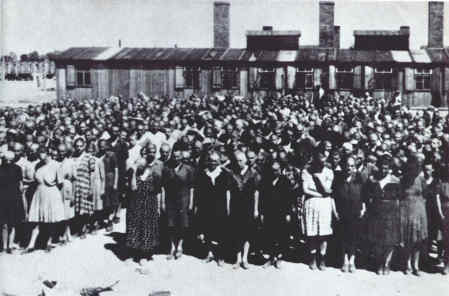
Inside Aushwitz
My sister (whose husband was killed in the beginning of the war on the Polish Front) had a little boy. We were all taken on the trains together, along with my mother. And when we were taken off the tracks, they made selections, "left" - "right", "left" - "right", and they took away all of the older women, and women with children. They took my mother and my sister with her little boy, maybe 7 years old, and they took them all together - and finished. The same night (when we arrived), a girl who worked in the showers - they were called the "Saunas"- she pointed to a fire in the distance and said to me "look, they are burning your parents, along with the whole town".
About 200 yards from our block were the gas chambers, where they would gas the people. The smell in the air was like a chicken was roasting. One day a girl came to me and said that she was sorting the clothing from the people (gassed) and she found the documents of my mother in the pockets.
After a while, people were taken away, and they died right and left, and no one knew information about anybody. But one day, in the very beginning, when the inmates still knew which town I was from, one boy screamed from the other block, "Chana Lengalka", "Chana Lengalka". And I was afraid to call back to him "Yes, Yes". And he told me "You know, today they killed your brother, because he wasn't working hard enough. They killed him with a rifle butt". And I was glad that they killed him, that he didn't suffer as long as I suffered. He lasted only a few weeks.
Auschwitz
Straight when we came to the camp they gave us numbers. "25-6-57" is the number on my arm. This was my name. If you look closely you can see little injections that they made with a needle. It was painful.
They had shaved off all our hair straight away, already in the Ghetto. And they would shave it again every few months, in the camps.
In the beginning I didn't understand a word of German. Later on, I learned a little bit... But when I didn't understand, they thought I didn't want to listen to them, and they would shout at me "Do you want to understand, or do you want to feel"?
They would wake us up at 4:00 AM. And we had to stand for so long in Appell (roll-call), until it started to get light. Even if it was raining or snowing, even if the world turned upside down, we would have to stand for hours in line. Girls would drop dead in the middle.
They gave us in the morning something they called "tea", a little bit of green stuff. For lunch they gave us a little bit of soup, better don't ask what was in the soup... When we came back after work they would give us a little portion of bread. A kilo bread was cut into 5 portions. It was a heavy dark bread, and it came out to very small portions. And that was the food for a whole day.
They made us do all types of work. It didn't matter what, as long as we were moving, "Bavegach, Bavegach, Bavegachen!" They made us knock down the walls of bombed out neighborhoods, clean the stones, dig out rivers... And when we came back from work everything was wet and dirty, you couldn't even take off your shoes because they were rotted onto your legs. It was just terrible!
When they made a delousing, they would give us a new change of undergarments that were taken from wounded soldiers, full of blood and yellow stuff, and that was what we had to wear. And when we would shower, they would come in with sticks and chase us out into the street all wet, with no clothes on, winter and summer... And then they would take us to work half naked.
Every Sunday they made selections. One time they would send some girls to the right, and others to left, and the next time they would reverse the sides. Nobody knew who was to live and who was to die. (No one knew which side meant life and which side meant death). Every Sunday I was ready to die.
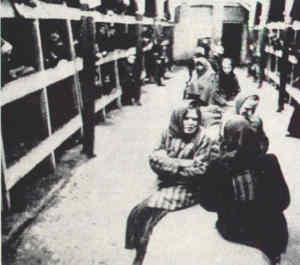
Inside Auschwitz
A German named Dr. Mengela would do big selections, once every half a year or so. When he came, everyone knew that the Lager (camp) would be completely finished (emptied out). In our block there was about 500 girls, and (after the selection) there would come back maybe ten.
Michael: Do you remember girls in the concentration camp that didn't want to work on Shabbos, or eat on Yom Kippur?
It wasn't a question of if you wanted to do something or not, you MUST! Who was thinking if they want to work on Shabbos or not?! The only right they had was to fast on Yom Kippur. You don't want to eat, you don't eat! But to be religious?!
Sarah (grand-daughter): Did you keep track of the days of the week?
I only knew when it was Sunday, because on Sunday we didn't go to work. They would keep us in the Lager, in the barracks. And for that, they would make a selection.
When I saw the Christmas tree burning by the German Lager, that is how I knew that one year had past. We had no track of time. Just back and forth, back and forth. They would drop dead at work, drop dead by the appell, then, (if you survived that) they took you to the selection - and finished.
They would burn the dead people on wires, and the fat that ran down they made into soap.
Once at work, a girl collapsed. She was 95% dead. Four girls were forced to carry her on a stretcher made with two sticks. We had to walk ten miles to work, and ten miles back. Every few miles, another four girls would change over (carrying the dying girls). We were bringing her back to the block where they would collect all the dead bodies and bring them to the crematorium. I was among the four girls who were changed over for the last stretch of the way. Everyone knew that the last four girls that were changed over were sent straight with the dead bodies to the Lager, and from there to the crematorium. But about 10 yards from the door where the dead bodies lay, they changed us over with another four girls.
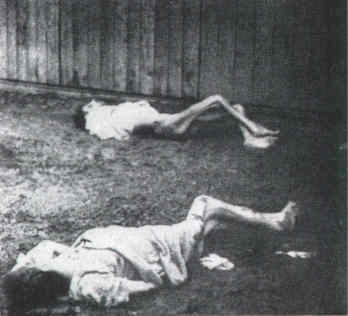
Sarah: The people were burnt alive?
No, they were taken with all the other half dead people, first to be gassed, and then to be burned.... Only little children were burned alive. They didn't want to bother gassing little children; they just grabbed them by the legs and threw them in.
... If they wouldn't have switched me over just then, I would be finished. The reason I was switched is because I was on good terms with the Fore-Arbeiter. Sometimes I used to give her a little bit of saccharin, or a little bit of sugar that I was able to "organize" by the men. And she was on good terms with me, so she changed me.
One time there was an announcement in the block that whoever is sick or is complaining about something, can stay in the barracks that day, and not go to work. And I told the Fore-Arbeiter, "Maybe I will stay too, because I am here nearly three years and I was not even one day in block". And she yelled at me "you duneh-kerri(?), you... she called me the worst names... You want to stay here?! You will go straight to heaven, commando!" ... The Germans made all kinds of tricks. If I had stayed they would have killed me right away... I knew a man who was in the Lager and he was together with two boys. The boys were sons of his sister - he was their uncle. And when they announced that whoever is complaining of something can stay, he told his two nephews, "Stay in the block today, I will go by myself to work today". And when he came back the two boys were gone.
For a while I worked in sorting the clothes of the people who were gassed. I could still feel the warmth in the children's shoes…
People often tried to commit suicide. They would run to the electric wires and try to electrocute themselves.
One time towards the end of the war, I was standing outside in the rain, trying to catch a few drops of water in a tin can to parch my thirst, and a soldier saw the number on my arm and he asked me "What? You are still alive?!".
Ima (daughter-in-law): What gave you the strength to survive for three whole years?
I don't know. I just told myself that I want to survive. "Maybe I will survive, maybe I will survive". I was strong like a horse. I was very strong. I never had been sick in my life. In all three years I never got sick once. (Laughing... And now I get sick every few days).
Ima: Did you sense that the Nazis were losing the war, towards the end?
Who bothered with politics? Everyone was worried about their portion of bread (laughs). While in the camp, we did hear once that there was an uprising in the Warsaw Ghetto. And the Nazis told us that they had liquidated everybody from Warsaw, all the Jews. They told us that there were no more Jews in Warsaw, and no more Jews in Poland.
After the War
When the war was over, we were more afraid than before. Because the Russians, the Germans, and the Americans (?) treated the girls very badly... After the war we were sent to an UNRWA (United Nations Relief and Works Agency) Lager. At the time of the liberation, I was feeling very bad, because I knew that no one had survived, and that I was totally on my own.
Sarah: How did you know?
Of course I knew! The gas chambers and crematorium had been only a few hundred yards from us!
Straight after the war we were brought to Czechoslovakia. Afterwards, we were brought to Poland. But Poland was very bad, ... with the Poles. Even the girls who came back from the concentration camps, they used to kill.... in the night ... The Polish Government police were all bandits and robbers... they killed the girls and everybody. I knew a girl from my town that had survived the war and she was killed when she came back.
We had left a fortune by one Polish workman, a basement full of men's shoes. And when I came back from the concentration camp, and I was in his place, I said to him "give me at least one pair of shoes for myself". And he lied to me and said, "I cannot give you anything, because the Germans took everything". And I said to him "If the Germans took everything, why didn't they take you too?"
When we saw how bad it was in Poland, people started talking about going back to Germany where we could find a little peace, since the American UNRWA would supply us with food and everything, so we went there. And my husband was there too, and that's where we met.
When my husband had come from Russia, all he had with him was a little suitcase. That was his whole fortune... We were in Germany for a few months, until my husband received a letter from his brother who was in France, and then we went there....
On the train, being smuggled across the border between Germany and France, I saw a little girl eating fruits, and I asked "Can it be, there are still fruits growing, after the war?" I couldn't imagine that there were still fruits in the world.
We were in France for 5 years before we left Europe. Berel was born in France, in Rothschild's hospital. He was 5 months old when we left Europe for Australia.
Yehudah Nudel 1914 (?) - 1997
Family History
I was born in Chelm. When I was one year old, we moved to Lublin. My father's name was Berel, like my son.
Michael: And what was your mother's name?
(Zaide chokes up) I cannot speak, I cannot speak…
After a few minutes…
My mother's maiden name was Rubin. I never saw my grandfather. My mother's father died before my time, and my father's father was in Chelm and we were in Lublin, and I was only a young boy, 6 - 10 years old, always poor.. (so we never got to see him).
I had three brothers. I was the youngest. There was Shlomo, Yaakov, and Shimon. My brother Shlomo, in Paris, was the oldest, and I was the youngest. Shimon and Yaakov didn't survive the war. Yaakov was with me in Lemberick (Russia), until he went back to Poland and…(didn't survive) (Zaide chokes up)….He was a good brother... It was a good family... (Zaide can't continue).
My father was a Baker. He baked only cakes... But we didn't even have bread at home to eat. We were a very poor family. We rented one room, and we had three or four beds in the room. The dining room and kitchen were all in that same room (laughs). The bathroom was outside. Don't ask what the conditions were like 60 - 70 years ago in Poland. It was terrible. 90% of people lived like that.
When I got breakfast in the morning, I was not sure if I would have lunch. And when I got lunch, I was not sure if I would have supper.
There were schools in Lublin, but I went only for a short time. I had to go to work....
Surviving the War
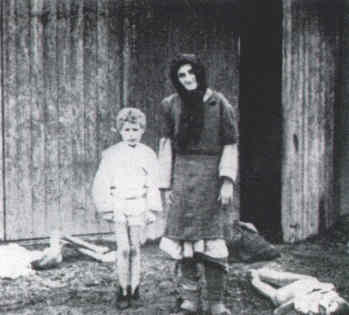
Surviving
When the Germans took over Poland, Polish teenagers 15, 16 years old would chase after the Jews on the street calling "a Jude, a Jude", and they would cut off the beards of the Jews on the streets. They couldn't speak German. They only knew one word in German "a Jude, a Jude". Whenever the Germans were patrolling the streets, the Polish were always quick to point out "das is a Jude, das is a Jude". And they would go around with scissors in their hands and cut off beard and payos (side curls) of the Jews.
One brother of mine (Shlomo), survived the war. He was in Paris. He was in Gefangen Lager (POW camp), by the Germans. He disguised himself as a Frenchman, (and hid his Jewish identity). There were a few Poles, maybe ten or twenty Poles, and he had more Tzuris (suffering) from them, than from two thousand Frenchmen....
When my brother would go to the bathhouse once a week, all the Frenchmen knew that my brother was a Jew, and they used to stand around him to cover him up. But from the ten or twenty Poles that were there, he had a lot of Tzuris. The Polish people were not better than the Germans, and the Germans were not better than the Polish.
I escaped the Nazis in Poland, and fled to Russia. My family stayed behind in Poland. In Russia, I joined my brother Yaakov in Lemberik, who had fled there before me. I was with him for 8 weeks.... Then my brother went back, and he is not anymore alive (he was killed).... (Zaide chokes up and can't speak) ...
After a few minutes…
…. Then I realized why he had gone back. I was still young at the time, 23 - 24 years old; I still didn't have Sechel, now I understand. He was older than me... He had left my father and mother, older people, and he realized that there were a few women, and no men, so he went back.
In Russia, the Communists sent us straight to Siberia. They didn't have to accuse us of anything. We were all considered "spies"; tens of thousands of people.
In middle of the night they came with a letter, "Nudel, Chaim, Moshe … this one, that one..." I told them that I need to take a suitcase with some undergarments, and some things with me... "No, No" they told me, "you will come back in a half an hour"... I never came back, and I never took my suitcase.
They took us to a station. Over there, were like 2000, or maybe even 5000 people, and they put us onto the train wagons and we traveled for a whole month, until we got to where they wanted us. The Russian management was very poor. We would travel for a day, and stop for two days... Here they didn't have fuel, here they didn't have this, they didn't have that... they were terribly organized. The entire time we had to stay on the train. They gave us every morning 200 grams of dark bread, with a little butter, or some pepper... and they would put it into the train and everyone would take.
We arrived at a camp, close to the border of Finland. I was there for one and a half years. From '43 to '45. It was like a concentration camp. We couldn't do anything. We worked every day in the forest.
One thing I can tell you... We had the same physical conditions as my wife (had in Auschwitz). The only difference is that I didn't have a constant fear of being shot, hit or gassed. All the other things however, were nearly the same. The food, the clothing, everything was nearly the same. The Communists and the Fascists are like two fingers (of the same hand).
In the camp they would question us for hours. Everybody. Why did you come here (to Russia)? Who is your father, who are your brothers? Was your father rich, did he have a factory? He was a bourgeois!... Stupid questions… The system would take you in the middle of the night, at 3 - 4 am, in the middle of your sleep, and the police, or a soldier would come and take you for interrogations... They tried to force me to sign (the accusations) but I didn't want to sign.
Sarah: What did they do to you for not signing?
The same as if I would have signed. Whether I signed or not, I knew they would give me ten years... They just wanted me to sign to make it more legal... Afterwards, the Polish government in London made a Pact with the Russians to release all of the Polish prisoners of the camp. If the Polish government wouldn't have made this deal, I would have been there for ten years. I was already supposed to receive the indictment (Schok), within a few weeks. Some people were sentenced to ten years, some to 15 years...
After they made this deal, we were let out. It was one and half to two years still, before the end of the war...
From there, I wandered around in Russia. I was in ... Moscow, Kulbishov, Charkov, who can remember? …Two weeks in this town, a year here… Almatan, Jambul, Tashkent, in Arkubist, in Nove-Sibere...
At the end of the war, all Polish citizens were let out of Russia to return to Poland. Every Pole was registered in the Burro, …your name, your city… and then they send us back to Poland. From Poland I went to Germany, and there I met my wife. My wife had a cousin who now lives in Boston, with her husband Gershon. My wife's cousin was in my camp in Germany, near Veiden (?) in the UNRWA camp. My wife was in another area, in Darbensburg (?). When my wife's cousin found out that she was alive, she sent her husband (Gershon) to take her to our camp, because she knew that my wife was all alone. In this Lager (camp) I met my wife. I knew her for a few months before we got married in Germany. At the wedding there was a Rabbi, a Chupah, and everything. It was a camp with a few hundred people. In the camp, there were Apikorsim (atheists) and there were also religious. Many people got remarried in those days, because many people had lost their husbands or wives.
We weren't there for long though, in the camp. Only for about two months. I put an advertisement in the French Jewish paper, because I knew that I had a brother there from before the war, in Paris. And someone told my brother, "I see your brother is alive" ... (Zaide chokes up with tears, and Buba scolds him: "What are you crying for?", Zaide says, "I don't want to, but I can't....)
When my brother found out that I was alive, he sent a smuggler to take us over the border from Germany to France. We walked for miles by foot. We stopped in an UNRWA camp before the border. From there, the smuggler took us in the middle of the night, along with another 12 or 14 people who had paid to be smuggled, through forests and fields, until we got to Strasburg.
from the December 2002 Edition of the Jewish Magazine
|










